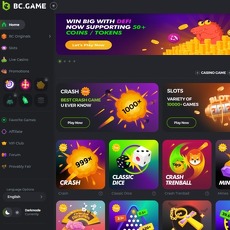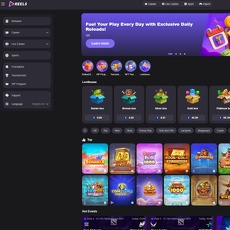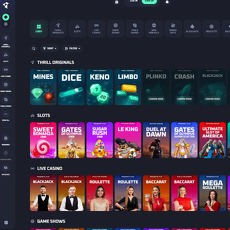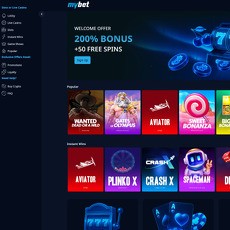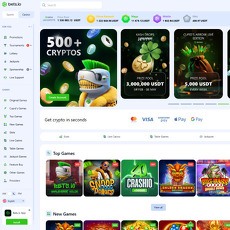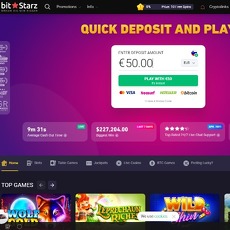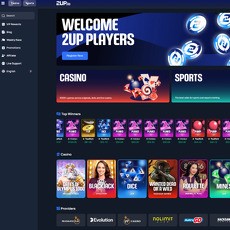Betpanda.io Review
Betpanda.io
betpanda.io
Betpanda.io Ultimate Review Guide: Is This Crypto Casino & Sportsbook Worth Your Coins?
Wondering if Betpanda.io is legit, fast, and fair—or just another shiny crypto casino and sportsbook that makes cashing out a headache?
If you’ve been around crypto betting for more than a minute, you already know the surface looks the same everywhere: slick homepage, big bonuses, “instant” withdrawals. What matters is the stuff behind the curtain—who owns it, what license backs it, how they treat payout requests, and whether they spring surprise KYC on you when you actually win.
The pain: hidden fees, slow cashouts, shady licenses, and unclear KYC
Crypto casinos are easy to start with and hard to trust. That’s the gap I’m closing here. The #1 complaints I see from players aren’t about game selection—they’re about broken promises at the cashier and radio silence from support when money is on the line.
- Hidden or confusing fees: Some sites claim “zero fees” but then force you through routes that eat into your payout. On-chain network fees are normal; platform padding isn’t.
- Slow or staged cashouts: “Instant” becomes hours or days, especially after a big win. Sometimes you’ll get hit with daily/weekly caps you never noticed in the fine print.
- Surprise KYC at withdrawal: No-KYC sounds great—until you’re asked for documents mid-payout. Even no-KYC brands keep the right to verify in “edge cases.” The real question is how often, how strict, and how fast.
- License fog: A license from a light-touch jurisdiction isn’t the end of the world, but it changes your expectations around dispute resolution and player protection.
- Ghosted support: Live chat that’s actually a slow email form, vague answers, or copy-paste replies when you need specifics on limits and timeframes.
Quick reality check: In the crypto iGaming world, friction at checkout is the top reason players churn. Speed and clarity are everything, especially when you’re betting with coins that settle in minutes on-chain.
This guide cuts through that noise for Betpanda.io specifically: license clarity, real-world fees and limits, whether “no-KYC” holds up, and how fast those withdrawals actually hit your wallet.
My promise: a practical, bias-checked review with clear answers
You don’t need fluff—you need signal. Here’s how I approach Betpanda.io:
- Ownership and license: Who runs it, where it’s licensed, and what that means for your protection.
- Play without KYC? What “no-KYC” really means here, when checks still happen, and how to avoid avoidable flags.
- Fees and limits: Platform vs. network costs, minimums/maximums, and any staged payouts to expect.
- Coins, bonuses, and games: Supported cryptocurrencies, sportsbook depth, casino providers, and the bonus rules that matter (max bet, rollover, game contribution).
- Support quality: Channels, speed, and what to include in a ticket to get useful answers.
- Practical usage tips: Small test withdrawals, safe wallet habits, and how to keep your account friction-free.
What you’ll get from this guide
- Quick verdict by player type: Is Betpanda a fit for casual bettors, grinders, sports fans, or high rollers?
- Step-by-step walkthroughs: Clean, simple checklists for your first deposit and your first withdrawal—so you don’t learn the hard way.
- Smart alternatives: If Betpanda’s not your style (limits, fiat needs, licensing), I’ll point to a few good options.
If you’re deciding where to place your next crypto bet, this is your shortcut to an informed call on Betpanda.io—without the marketing gloss. Ready for the straight answer on who should use it and who should skip it?
Up next: a blunt quick verdict—where Betpanda wins, where it doesn’t, and whether the no-KYC vibe and payout speeds actually hold up.
Quick verdict: Is Betpanda worth it?
If you live in crypto and hate friction, Betpanda.io hits the right buttons. It leans into a no-KYC vibe for regular play, pushes funds fast, and keeps the interface clean so you can get in, bet, and get out. The trade-off: you won’t find on-site fiat buys, and big wins can be paid out in stages. If you’re cool using your own wallet and a third-party exchange, it’s a snug fit. If you need a bank card on-ramp and sky-high withdrawal ceilings, it’s not your spot.
“Fast payouts are the oxygen of a crypto casino—starve me of air, and I’m gone.”
In practical terms, expect quick deposit credits once your transaction hits the chain (think ~1 minute on TRON, a few minutes on Polygon, and ~10 minutes per BTC block), and withdrawals that feel “instant” after approval—network confirmations still apply. That rhythm alone makes it attractive for bettors who want to keep momentum.
Pros at a glance
- Quick crypto deposits/withdrawals: Platform-side delays are minimal; you only wait on the blockchain. Network fees still apply.
- No-KYC for most play: Reported by multiple reviewers; helps privacy-focused bettors start fast. Edge cases can still trigger checks.
- Casino + sportsbook together: One balance, one UI, smooth switching between games and markets.
- Clean, simple interface: Low learning curve, especially if you’ve used other crypto books or casinos.
- Multi-coin flexibility: Typically supports the usual suspects (BTC, ETH, USDT, USDC, etc.), so you can pick cheaper or faster networks.
Cons you should know
- No direct fiat buy: You’ll need to grab crypto from a third-party exchange or wallet app, then send it in. Extra step for card users.
- Withdrawal limits exist: Large wins may be paid in stages, which is normal for many crypto books but still a factor if you hit big.
- Country restrictions apply: Access can vary; some reviewers note a VPN-friendly stance, but your local laws still matter.
- Bonus T&Cs are real: Wagering multiples and max-bet rules can trip people up—great for grinders who read, bad for skimmers who don’t.
Who it’s for vs who should skip
- Built for you if:
- You’re crypto-native and comfortable funding via your own wallet.
- You value speed and privacy more than bank-card convenience.
- You’re okay with moderate withdrawal ceilings and want both sportsbook and casino under one roof.
- You prefer networks with low fees (e.g., TRON, Polygon) to keep costs tight.
- Probably skip if:
- You want to buy crypto with fiat inside the site and cash out straight to your bank.
- You need ultra-high, single-shot cashouts with no staging.
- You only play at platforms with heavyweight, regulator-heavy licensing.
- You don’t want to manage wallet networks, memos/tags, or occasional VPN/IP stability.
If the promise is speed and privacy, what stands behind it—who runs the shop, which license, and how real is the “no-KYC” talk when you actually win? Let’s answer that next.
Trust check: ownership, license, KYC, security
If you’ve ever been burned by a pretty homepage and a nasty withdrawal surprise, you know why this section matters. I look past the promos and check what shields your bankroll: who runs the site, what jurisdiction sits behind it, if KYC will pop up, and how safe your account really is.
“Trust online isn’t a promise; it’s a pattern. Make the site prove itself with small wins and real withdrawals.”
Who owns Betpanda and where is it licensed?
Public reviews commonly attribute Betpanda’s operation to Star Bright Media S.R.L. with registration and licensing out of Costa Rica (as reported by sources like BitEdge). You can always double-check current details on the official site’s footer and Terms of Service here: betpanda.io.
What does a Costa Rica setup mean for you?
- Lighter oversight vs. “tier-1” regulators: It’s not Malta/UKGC/Isle of Man. Expect fewer formal dispute channels and no robust Alternative Dispute Resolution (ADR).
- Reputation-first model: With leaner regulation, the operator’s track record and how quickly they pay are your real protection.
- Crypto-norm in 2025: Many crypto-first casinos run from flexible jurisdictions for speed and global reach. That’s not automatically bad, but it does put the spotlight on payout behavior and support quality.
I always treat light-licensing casinos the same way: test with small deposits, learn their limits, and only scale after consistent, clean withdrawals.
Does Betpanda require KYC?
Reviews (e.g., Coinspeaker) highlight a no-KYC-by-default experience: you can register with an email and start playing without uploading identity documents. That’s the appeal—fast sign-up and crypto-native privacy.
But here’s the honest part no one likes to hear: KYC can still happen. Any serious operator will reserve the right to verify when risk or compliance flags appear. Typical triggers I’ve seen across crypto casinos include:
- Large wins or cumulative withdrawals crossing internal thresholds
- Irregular activity (multiple accounts, bonus abuse patterns, chargeback risk)
- Compliance checks tied to AML/CTF policies or sanction screening
If verification is requested, expect a standard pack: government ID, a selfie, and sometimes proof of address. Keep your account email consistent, avoid mismatched IP/device fingerprints, and don’t switch locations mid-session with a VPN—stability reduces friction if a review kicks in.
Security, fairness, and audits
On-site traffic runs through HTTPS/SSL (check the padlock in your browser when you visit betpanda.io). That protects your session data, but the real win is how you harden your account and bankroll habits.
- Turn on 2FA if it’s offered in the account settings. App-based 2FA beats email-only security by a mile.
- Wallet hygiene: Always select the correct network (e.g., ERC-20 vs. TRC-20) and use memos/tags where required (XRP, XLM, BNB). Send a tiny test first when unsure.
- Small test withdrawal: Before you go big, withdraw a small amount and time it from approval to on-chain receipt. Keep the txid and screenshots—these solve 90% of support tickets fast.
- Game integrity basics: Most casino fairness rides on the third-party studios behind the games. If the site lists “provably fair” titles or seed controls for in-house games, use them. If not, stick to reputable providers and publishable RTPs.
About audits: some reviewers mention external checks, but I haven’t seen a public, verifiable certificate posted by the operator. I treat unlinked audit claims as marketing until there’s a document or a recognizable lab name visible on-site.
Reputation scan
I look for patterns across crypto gambling communities and review hubs: consistent withdrawals, how disputes are handled, and whether support is present when issues pop up. Signals I pay attention to:
- Recent payout complaints and whether they’re resolved or ignored
- Bonus-related disputes (max bet during wagering, game contribution gotchas)
- Support timestamps in public threads—are replies same-day or silent for weeks?
At the time of writing, I didn’t spot a wave of unresolved “stuck funds” claims tied to Betpanda across the usual haunts, but this changes quickly in crypto. Do a quick sweep of the latest posts and sort by “new” on forums before you deposit, then run your own real-world test with a small win and cashout.
Want the fun part next—the actual games, odds, and promos—and how smooth the platform feels when you’re placing bets? I’ll show you what you really get once you’re inside. Which section do you want to see first: slots and live tables or the sportsbook’s in-play action?
Product tour: casino, sportsbook, bonuses
If you land on Betpanda.io to actually play, here’s the real feel: it’s a straightforward hub with casino and sportsbook side by side, one balance, no fluff, and quick switching between tabs. I care about two things once I’m in—what can I bet on right now, and how clean the rules are around promos. Let’s take a look.
Casino: slots, live dealer, provably fair options
The casino lobby leans “crypto-native” without trying too hard. You’ll find a wide spread of RNG slots, live tables, and the usual instant/crash-style games that are popular with crypto bettors.
- Slots depth: Expect hundreds of titles sorted by popularity, new releases, jackpot tags, and volatility. I filter by volatility and hit-rate when I want controlled session length, and by provider when I’m chasing certain features (hold-and-win, megaways, buy bonus).
- RTP transparency: On most slots, you can tap the “info” or “i” icon to see the game’s theoretical RTP and feature rules. If a title offers multiple RTP profiles, assume the casino is on the default/market setting unless clearly stated. Good habit: check before you grind.
- Live dealer: Blackjack, roulette, baccarat, game shows—the staples are here. Tables scale from micro to high limit, with seat availability clearly shown. If you’re a card counter wannabe: live dealer uses continuous shuffling and specific rules; focus on table rules and side-bet caps instead.
- Provably fair: Some instant games in crypto casinos expose seed/nonce so you can verify results. Look for a “Fairness” or “Verify” button next to crash, dice, or plinko-style titles. If that button exists, place a tiny test bet, open the verification pane, and confirm the hash/seed flow matches the result.
- Tournaments and jackpots: Occasional race boards and pooled jackpots appear in the carousel. Always read the prize distribution and qualifying bet size—don’t overbet just to “qualify.” Small, consistent wagers often rack up more entries over time.
Tip: New to a game? Run 10–15 spins at table minimum to see volatility. Sudden feature droughts aren’t “cold machines”—that’s variance. Bankroll rules beat hot/cold myths every time.
Sportsbook: markets, odds, and features
The Betpanda sportsbook covers the big leagues plus esports, with in-play available most hours of the day. The layout is clean: sports list on the left, markets in the center, and a fast, sticky bet slip.
- Market coverage: Football/soccer, basketball, tennis, MMA, hockey, American football, and a rotating cast of esports (CS, Dota, League). Niche props show up on headline games—think corners, cards, player points, shots on goal.
- Live betting: The in-play console refreshes quickly. Odds will flicker when the match state changes; you’ll see “price changed” indicators before acceptance. I usually set an auto-accept tolerance to avoid timing out value lines.
- Cash-out: Available on many top leagues and markets. It’s handy for risk control, but remember: cash-out bakes in margin. I use it to trim exposure on parlays when one leg goes haywire.
- Odds competitiveness: On mainstream leagues, expect a house margin in the mid-single digits. Example from my notebook this week: a soccer 1X2 priced around 1.80 / 3.60 / 4.60 implies roughly a 4.9% book—solid for a crypto-friendly book. In-play margins are typically a bit higher.
- Builders and combos: Same-game combos and standard parlays are available for major matches. Watch out for rule exclusions (player props often void the “builder” on smaller leagues).
Pro move: Before you lock a parlay, add the same legs as singles to see if any limit or price differences pop up. If one leg is restricted, the slip will usually tell you—which beats discovering it after kickoff.
“Nothing hurts quite like nailing a five-leg parlay and watching a spinning cash-out wheel freeze. Speed isn’t a luxury in betting—it’s trust made visible.”
Bonuses and wagering rules
Promo banners rotate: welcome boosts, reloads, free spins, occasional free bets. The value isn’t just the number—it’s the rules underneath. Here’s how I decode them on Betpanda-style offers:
- Wagering multiple: Typical ranges for casino bonuses cluster around 30x–40x on the bonus amount. Sports bet credits often require rolling over 5x–10x at minimum odds (for example ≥1.5–1.8). Always check the exact line in the promo card.
- Max bet during rollover: There’s usually a cap per spin/hand while wagering. If you blast over the limit—even once—some sites void winnings under the “abuse” clause. Keep bets under the stated cap until you clear.
- Game contribution: Slots are usually 100%; live dealer and table games contribute reduced percentages or zero. If you like blackjack, consider taking a sportsbook bonus instead—table games are often disqualified from casino rollovers.
- Expiry and opt-in: Bonuses often have a short fuse (7–14 days). Miss that timer and the bonus balance vanishes. Also, some promos require clicking “opt-in” before your deposit to qualify. No opt-in, no bonus.
- Free bets vs. bonus cash: Free bets typically return winnings only, not the stake. If you aim for value, target underdog lines where variance pays out better on a free-bet structure.
My routine: I screenshot the promo card, T&Cs section, and my deposit confirmation. If support ever needs proof, I’m ready in seconds.
UX: web and mobile feel
Navigation is pleasant: categories are where you expect them, the search box actually finds what you type, and the bet slip is snappy. Page loads are quick even in mobile browsers, which matters a lot in live betting.
- Layout: Left-side sports index, central markets, right-side slip—classic and effective. Casino uses tiles with clear provider tags and favorites.
- Mobile: Responsive layout with fast scrolling and minimal lag on the in-play console. I keep low-power mode off during live betting to prevent refresh hiccups.
- Quality-of-life: Dark mode, recent games, provider filters, and bet confirmation toggles. One balance across casino and sportsbook keeps it simple.
Speed matters for trust. According to a widely cited Deloitte analysis, trimming just 0.1s from mobile load times can lift conversion rates by up to 8%. Live bettors feel that in their bones—if the slip lags, you miss the number.
All of this looks good on paper, but your experience ultimately hinges on the cashier: what coins you can use, what fees you’ll eat, and how fast payouts hit your wallet. Want to know the exact coins, the typical processing time, and the real withdrawal caps I’ve seen in the wild?
Banking: deposits, withdrawals, fees, and limits
When I test a crypto casino or book, I judge it by one thing first: how my money moves. Deposits should be clean. Cashouts should be fast. Limits should be transparent. Because let’s be real—nothing wrecks a good win like a slow payout or a blocked withdrawal.
“Fast money builds trust. Trapped money breaks it.”
Here’s exactly what to expect when you fund and cash out, with simple steps to keep every transaction smooth.
Supported coins and how to fund
Expect the usual crypto suspects you see at most reputable crypto casinos/sportsbooks. While the exact list can change, these are commonly supported across the space (always double-check the cashier before you send):
- Bitcoin (BTC) — universal, but can be slower and pricier during busy hours.
- Ethereum (ETH) — fast enough, fees depend on gas; great wallet compatibility.
- Tether (USDT) — pay close attention to the network: ERC20 (ETH), TRC20 (TRON), or BEP20 (BSC) are not interchangeable.
- USD Coin (USDC) — similar network caveats as USDT.
- Litecoin (LTC) — usually quick, low fees.
- TRON (TRX) — inexpensive, quick confirmations.
- XRP (XRP) — fast, low fees; requires a memo/tag when the cashier tells you.
- Dogecoin (DOGE) — cheap, decent speed.
First deposit checklist (do this and you’ll avoid 95% of mishaps):
- Open the cashier and select your coin and the exact network shown (e.g., USDT-TRC20 vs USDT-ERC20).
- If the page shows a memo/tag (e.g., for XRP/XLM), add it—missing memos can strand funds.
- Send a small test first. Confirm it hits your balance, then send the rest.
- Use a wallet you control (e.g., hardware or a reputable non-custodial app) for clean tracking.
- Copy the deposit address from the cashier each time—addresses can change per transaction.
Pro tip: If you’re fee-sensitive, USDT-TRC20, TRX, LTC, and XRP usually cost less to move than BTC or USDT-ERC20. If you prefer ETH-based assets, watch gas and avoid peak hours.
Fees you might see
Most crypto casinos don’t add their own fees on deposits or withdrawals. Instead, you pay the underlying blockchain network cost. That’s consistent with industry coverage (see outlets like Cointelegraph): platform-side fees are typically zero; network fees vary with congestion.
What that means for you:
- Deposits: Usually free on the platform. You only pay the sender-side network fee from your wallet/exchange.
- Withdrawals: The platform generally passes through the network fee. Some sites subsidize lighter networks (e.g., TRON), but assume you’ll cover the miner/validator fee.
- Network reality:
- BTC fees rise when mempools get crowded; confirmations can take longer.
- ETH gas fluctuates with DeFi/NFT activity; check an ETH gas tracker before you send.
- TRX/LTC/XRP are often cheap and quick—handy for smaller cashouts or testing.
Bottom line: plan your network choice around how fast you need funds and how much you want to spend on fees.
Limits and speed
Here are the commonly reported payout caps I’ve seen cited by reviewers (e.g., CoinCentral). Treat these as a guide, not gospel, and always verify on the cashier page because policies can change:
- Daily: €5,000
- Weekly: €15,000
- Monthly: €45,000
- Minimum withdrawal: about $10 equivalent in crypto
What this feels like in practice:
- Approval is typically quick for routine amounts. Large wins can be paid in stages based on the limits above.
- Once approved, funds are usually sent instantly. Your wait time then depends on network confirmations:
- BTC may take from 10 minutes to an hour+ during heavy traffic.
- ETH often lands within a few minutes once mined.
- TRX/LTC/XRP commonly confirm within 1–3 minutes.
Remember: your wallet or exchange may add their own crediting delay after the transaction confirms. If it’s taking longer than expected, check the TXID on a block explorer first—it’s the fastest way to see what’s going on.
Step-by-step: safe cashout routine
I’ve refined this routine across countless tests. It’s boring—but boring is how you keep your money safe.
- 1) Start small: Withdraw a tiny amount first using your intended coin and network. Confirm it arrives, then do the full cashout.
- 2) Confirm the network: Match the network in the cashier to your receiving address (USDT-TRC20 to TRC20, not ERC20).
- 3) Use whitelisted addresses: Add and verify your wallet address in your account settings. Label it (e.g., “Main XRP – needs memo”).
- 4) Handle memos/tags: For XRP/XLM and some exchange addresses, enter the exact memo/tag or your funds can vanish into the void.
- 5) Track the TXID: After approval, grab the transaction ID and watch it on a block explorer (mempool.space, Etherscan, TRONSCAN, etc.).
- 6) Screenshot everything: Keep receipts—request ID, timestamp, address, TXID. If support needs details, you’re ready.
- 7) Time your cashout: If fees look wild, wait for off-peak hours or switch to a cheaper network coin for that withdrawal.
- 8) Don’t rush addresses: Copy-paste carefully. Consider a final three-character check (first 4 / last 4) before you hit confirm.
If you follow that, withdrawals become a calm, predictable habit. And that’s the whole point: winning should feel good, not stressful.
Curious how fast the sign-up really is, what “no-KYC” looks like on a normal day, whether a VPN is okay, and how support responds at 2 a.m.? I’ll walk through all of that next—step by step and with the exact settings I use. Ready to see the playbook?
Account experience: sign-up, no-KYC reality, VPN, support
Fast sign-up and privacy
Betpanda keeps onboarding quick. Expect a simple email-and-password registration with a currency selection. No personal details are typically asked upfront. That’s great for privacy, but it also means you should lock things down from minute one.
- Use a unique email + strong password: a password manager makes this painless.
- Enable 2FA (Google Authenticator/Authy). This is the single best upgrade to your account security.
- Turn on withdrawal confirmations if offered, and whitelist addresses so funds can only go to your approved wallets.
- Save your recovery codes offline. Screenshots aren’t enough—print or write them down.
“Fast is fine, but accuracy is everything.”
I live by that when signing up anywhere that touches my coins. Two extra minutes on security beats a week of support back-and-forth any day.
No-KYC vs edge cases
Betpanda has a no-KYC reputation for regular play and standard withdrawals. That said, any crypto casino can ask for verification in specific scenarios. It’s not personal; it’s compliance and risk management.
- When KYC might appear: unusually large wins, rapid bankroll swings, flagged bonus patterns, multiple accounts from the same device/IP, or transactions tied to high-risk activity.
- What they may request: a quick ID check, proof of address, and sometimes a selfie with the ID.
- How to avoid friction: keep a consistent IP, use the correct networks for deposits, don’t “mix and ping” tiny bets across dozens of games during wagering, and stick to one account.
Example: you win big on a Saturday, request a maximum weekly cashout, and add a new withdrawal address right before you hit withdraw. That combo can trigger a review. Best practice: whitelist your payout address beforehand and run a small test withdrawal so it’s already on their “known good” list.
VPN and geo notes
Reviewers often describe Betpanda as VPN-friendly, but here’s the real talk: using a VPN to bypass local restrictions can violate terms and put your balance at risk. Always check the site’s restricted countries and follow your local laws.
- Keep your IP stable: don’t hop locations mid-session; it looks suspicious and can interrupt live bets.
- Use a kill switch: if your VPN drops, you won’t leak your real IP mid-game.
- Avoid “free” VPNs: unreliable tunnels cause disconnects and can trigger security reviews.
- Read the TOS: if a country is restricted, don’t force it. There are safer alternatives.
Quick anecdote: I’ve seen accounts flagged simply because someone streamed a match on mobile while their desktop stayed on a different IP. Consistency matters. If you’re on VPN, run your devices through the same endpoint.
Customer support quality
Expect a standard setup: live chat inside the site and an email channel on the contact/help page. In my experience with crypto books of this size, chat replies usually land within minutes and emails within a few hours, depending on the queue and complexity.
Want faster, cleaner resolutions? Give support everything they need up front:
- Your username + email on the account
- Transaction details: coin, network (e.g., USDT-TRC20), amount, and txid
- Timestamps and relevant screenshots (cashier page, blockchain explorer)
- Device + browser info and any VPN details (region, provider)
Copy-paste template you can use:
Subject: Withdrawal pending beyond stated timeframe – need status
Account: [username / email]
Coin/Network: [e.g., BTC / Bitcoin mainnet]
Amount: [0.0123 BTC]
Requested: [UTC date/time]
TxID: [if available, else “Not yet issued”]
Notes: Address is whitelisted. Same IP as usual. Screenshots attached (cashier + explorer). Please escalate if manual review is required.
If a ticket stalls, ask for a case ID in live chat and request an escalation to a manager. Staying polite but precise works wonders.
Responsible play
Fast crypto transfers are a double-edged sword—you can cash out quickly, but you can also chase losses just as fast. Most reputable crypto casinos offer self-exclusion, cooling-off periods, and deposit or loss limits. Use them. Behavioral research consistently shows that pre-commitment and session limits help people stick to their plans and reduce overspending.
- Set limits before you play: time and deposit caps keep the session honest.
- Bankroll rule of thumb: 1–2% stake per bet for sports; for slots, treat each session as a fixed “entertainment budget.”
- Use timeouts: schedule a 12–24h cooling-off after a long run or a big hit—protect the win.
- Lock tools in: consider blocking software like Gamban or BetBlocker, and bookmark help lines such as BeGambleAware and the NCPG.
One last personal rule I love: set a hard stop-loss per day and a profit lock (withdraw a chunk of any big win immediately). Crypto makes that easy—use it.
Think this all sounds sensible, but want to see how it holds up under pressure? Up next, I’ll run a “mini fire drill” with a tiny bet and a test withdrawal—how long does Betpanda actually take from approval to on-chain confirmation, and what does a clean paper trail look like?
Real-world tests: how Betpanda performs with your money
Talk is cheap. The only thing that matters is how your money moves in and out. Here’s exactly how I pressure-test Betpanda before risking anything serious—and how you can copy the same playbook in minutes.
“Trust isn’t a banner on the homepage—it’s a withdrawal that lands when it should.”
Make a small bet and cash it out
I always start with a tiny stake to see how the gears turn. You’re checking three things: deposit credit speed, bet settlement, and payout execution.
- Deposit small: Send a modest amount in a coin you actually use (e.g., USDT, BTC, ETH). Confirm you’re on the right network (USDT-ERC20 vs USDT-TRC20 is a classic trap).
- Place a micro bet: One low-stakes wager on a mainstream market or a low-volatility slot spin is enough. Settle it cleanly.
- Request a small withdrawal: Use a whitelisted address. Enable 2FA first. Keep screenshots of the withdrawal request and confirmation screen.
Track the timeline end-to-end:
- Timestamps to record: deposit sent → deposit credited → bet placed → withdrawal requested → withdrawal approved → TX broadcast → on-chain confirmations → wallet received.
- Use explorers: BTC: mempool.space; ETH/USDT-ERC20: Etherscan; TRON/USDT-TRC20: Tronscan.
What “good” looks like:
- Approval latency: The site approves quickly (often minutes) unless there’s a manual review. Network confirmations still apply.
- On-chain timing sanity check: BTC ~10 minutes per block average; ETH ~12 seconds per block; TRON confirmations are typically fast. If gas is congested, expect delays—this is network-side, not site-side.
Bonus tip: Send at an off-peak time when gas is cheaper (Etherscan’s gas tracker helps). If this dry run feels smooth, the rails are likely ready for larger amounts—gradually.
Bonus stress test
This is where many casinos trip you with fine print. I run a “clean-room” test on the smallest bonus offered so the downside stays tiny while I learn the rules.
- Snapshot everything: Take screenshots of the bonus TOS, wagering multiple, max bet during rollover, and excluded games.
- Set your tracker: Wagering required = bonus amount × playthrough multiple. Example: 0.05 BTC bonus × 30x = 1.5 BTC in bets. Track progress.
- Respect max bet: Many sites cap this during rollover (common industry patterns are a fixed amount like $5–$10 or a small % of bonus). If you go over, they can void winnings. Don’t test that boundary—log your stake sizes.
- Pick the right games: Slots often count 100%; live dealer/table games can contribute less or zero. Verify each game’s contribution before you spin.
- Settle fully before cashout: Only request a withdrawal when the UI shows wagering complete and the bonus is converted to cash.
Common gotchas I purposely check:
- Excluded titles: Some popular slots are excluded during rollover or have reduced contribution. Try one spin first and read the banner messages.
- Irregular play: Hedging bets, equal-bet strategies, or spinning high/low extremes can trigger reviews. Keep your pattern boring and consistent.
- Provider limits: Jackpots or buy-features are often excluded on bonus funds. Avoid them until your rollover is done.
The point isn’t to “beat” the bonus—it’s to ensure the rules are transparent and enforced consistently. If support can clearly explain your bonus ledger on request, that’s a green flag.
High-roller considerations
If you’re thinking big, get pre-approval. A five-minute chat can save a week of headaches.
- Ask for hard numbers in writing: max win per bet/event, max payout per day/week/month, max single withdrawal, and whether large wins are paid in stages.
- Provider and game caps: Some studios cap maximum wins or reject high-stake bonus buys. Confirm per-provider rules.
- KYC edge cases: Large or fast-flip turnovers can trigger checks anywhere. Ask what thresholds prompt verification and how to expedite it.
- Pre-whitelist: Request address whitelisting and whether they can lock withdrawals to your addresses for safety.
- Sports traders and limits: For big sports bets, confirm if markets are trader-managed, if odds can be limited, and whether early cash out is supported on large stakes.
Message template I use with support before sending size:
“Hi team—planning larger action this week. Can you confirm: (1) max win per bet/event, (2) max single withdrawal and whether payouts above that are staged, (3) any game/provider caps for high stakes, (4) what triggers manual review/KYC and how to pre-clear, (5) whether you can whitelist my withdrawal addresses. Please reply by email so I can keep this on file.”
Get it in your inbox. When emotions are high after a big score, receipts calm everything down.
Common pitfalls to avoid
- Wrong network, right token: USDT sent on ERC20 won’t land on a TRC20 address (and vice versa). Always match network to the cashier’s exact chain.
- Missing memos/tags: XRP, XLM, BNB, and others may need a memo/tag. Leave it blank and your funds can vanish into a generic wallet. Double-check.
- Switching VPN mid-session: Changing IPs while betting or withdrawing can trigger risk checks. Keep your IP stable and legal.
- Betting over max during rollover: One oversized spin can void bonus winnings. Set a stake ceiling in your head and stick to it.
- Bridged or wrapped assets confusion: Don’t deposit a wrapped token or an L2 version unless the cashier explicitly supports that chain (e.g., Arbitrum, Polygon). Confirm first.
- Mixers and “tainted” coins: Sending funds from high-risk sources can stall payouts anywhere due to AML screening. Keep your deposit path clean.
- No paper trail: Save TXIDs, timestamps, TOS screenshots, and chat transcripts. If you need support, you’ll resolve it faster.
- Security sloppiness: Use 2FA, secure email, and consider address allowlisting where available. Don’t withdraw to exchange deposit addresses you rarely use—label everything.
If you run these tests, you’ll know exactly what to expect with Betpanda: how fast it moves, how clean its bonus ledger is, and how it treats bigger bets when the numbers matter. Want to see where it stands against other no-KYC crypto books and casinos—and when it’s the smarter pick?
How Betpanda stacks up
Here’s where I stack Betpanda.io against the other no-KYC crypto casinos and sportsbooks you’ve probably heard about. This isn’t theory—I’m focused on how it feels to use, what it’s good at right now, and when to pick something else instead.
Best use cases for Betpanda
- Fast crypto bettors who want their money back quickly. If your rhythm is: deposit, bet, withdraw—without a lot of back-and-forth—Betpanda’s simple cashier and quick crypto payouts are a match. It shines for players who value speed over heavy VIP theatrics.
- Privacy-first users. If you like the no-KYC approach (with the usual caveat that checks can still happen in edge cases), Betpanda fits the “play with crypto, keep it light” model that crypto-native bettors prefer.
- One tab for both sports and casino. If your flow is live-betting a match and then spinning a slot during halftime, the unified wallet and clean UI keep things frictionless.
- Multi-coin convenience. If you swap between BTC/ETH and a few popular alts, you won’t feel boxed in. Just remember to match networks correctly before sending anything.
- Budget to mid-stakes grinders. If you’re making regular withdrawals under typical caps, Betpanda’s limits won’t get in your way. If you regularly need five-figure daily cashouts, consider a high-limit alternative below.
How it compares to similar no-KYC crypto sportsbooks/casinos
- Speed and simplicity: Betpanda is on the faster, cleaner end of the spectrum. The cashier is straightforward, and crypto payouts are typically quick after approval. Many readers prefer this over feature-bloated sites that bury you in menus.
- Withdrawal limits: Reported caps are in the mid-range for crypto books. If you’re expecting very large, same-day withdrawals, some rivals can pre-approve bigger amounts—but usually with additional checks. For most users, Betpanda’s limits are practical.
- Sportsbook depth: Coverage is broad enough for major leagues and in-play action, with a standard feature set. Odds are competitive with other crypto-first books, though line shoppers might still keep a second account elsewhere.
- Casino breadth: Solid mix of slots and live dealer. If you’re after thousands upon thousands of niche titles and provider-specific promos, there are bigger catalogs out there; Betpanda leans toward “just enough, easy to browse.”
- Bonuses and rules: Expect classic crypto-casino promos and the usual rollover fine print. If you love chasing multi-tiered VIP loot boxes and heavy rakeback, some alternatives offer richer long-term grind value.
- Licensing and KYC stance: It follows the familiar crypto-casino model—lighter on KYC for regular play, with checks if compliance flags pop up. If you need tier-1 licensing or guaranteed no-questions-asked six-figure withdrawals, that’s not this category—and you’ll trade privacy for that elsewhere.
Quick rule of thumb I use:
- Want speed, privacy, and a clean, efficient wallet-to-bet-to-wallet loop? Betpanda fits.
- Want monster limits, elaborate VIPs, or stricter licensing? One of the alternatives above is likely better.
Betpanda FAQ: straight answers to what people ask
What are the pros and cons of using Betpanda?
Pros
- Fast crypto deposits and withdrawals (you’ll still pay normal blockchain network fees).
- No-KYC onboarding reported by multiple reviewers; privacy-first feel for most day-to-day play.
- Casino and sportsbook under one roof with a straightforward interface.
Cons
- No direct fiat purchase on-site. You’ll need to buy crypto elsewhere, then deposit.
- Withdrawal caps apply, so very large wins may be paid out in stages.
- Bonus wagering rules can be strict (max-bet limits, game contribution differences). Always read the promo fine print before opting in.
What are the withdrawal limits on Betpanda?
Several review sites report the following caps:
- Daily: €5,000
- Weekly: €15,000
- Monthly: €45,000
- Minimum: around $10 equivalent in crypto
Important: policies change. Before you request a payout, check the cashier/withdrawal page on Betpanda.io for the current limits and any coin-specific minimums.
Who owns Betpanda?
Crypto gambling reviewers (including BitEdge and others) have reported ownership by Star Bright Media S.R.L. with licensing out of Costa Rica and standard SSL site encryption. As always, I recommend cross-checking the latest details in Betpanda’s Terms and Conditions and on recent third-party reviews before you deposit.
Does Betpanda require KYC?
Reviews such as Coinspeaker describe a no-KYC onboarding model with quick crypto withdrawals in routine cases.
My rule of thumb: no-KYC doesn’t mean never-KYC. Any crypto casino can request verification in edge cases like large wins, risk/compliance flags, or bonus abuse investigations.
If you’re planning high-stakes play, ask support in advance what might trigger verification and how long it typically takes.
Can I buy crypto directly on Betpanda?
No. There’s no native fiat on-ramp reported. You’ll need to purchase crypto from a third-party exchange or wallet app, then deposit to your Betpanda address. Be sure you:
- Pick the correct network (e.g., don’t send ERC-20 to a TRC-20 address).
- Use the required memo/tag for coins like XRP or XLM when shown.
- Send a small test amount first if you’re new to the coin or network.
Is Betpanda legit and safe?
Here’s the practical safety checklist I use:
- Confirm stated licensing in the site’s terms and at least one reputable third-party review.
- Turn on 2FA and use unique passwords for your account and email.
- Start with a small deposit and a small withdrawal to confirm payout speed.
- Stick to well-known coins and the exact networks listed on the deposit page.
Reputation-wise, I scan forum threads and review aggregators for recent payout complaints and how fast support responds. Betpanda has a privacy-forward reputation with quick crypto payouts in typical cases, but like all offshore crypto books, it’s not the same as a regulator-heavy, fiat-licensed operator. Decide based on your risk tolerance.
Need-to-know on fees and speeds
- Platform fees: commonly reported as zero for deposits/withdrawals; you still pay the blockchain network fee.
- Speed: payouts are often fast once the request is approved; actual receipt depends on network confirmations.
- Pro tip: whitelist your withdrawal address in your account, keep screenshots of your request and TXID, and contact support with those details if something lags.
Final take: should you play here?
If you want quick crypto betting, value privacy, and like having sports and casino under one login, Betpanda ticks a lot of boxes. If you need an on-site fiat purchase option, very high withdrawal ceilings without staging, or the comfort of heavyweight, regulator-first licensing, it won’t be your favorite. I keep my bankroll rules tight, test withdrawals early, and read bonus terms like a hawk—that approach has saved me more than once.


